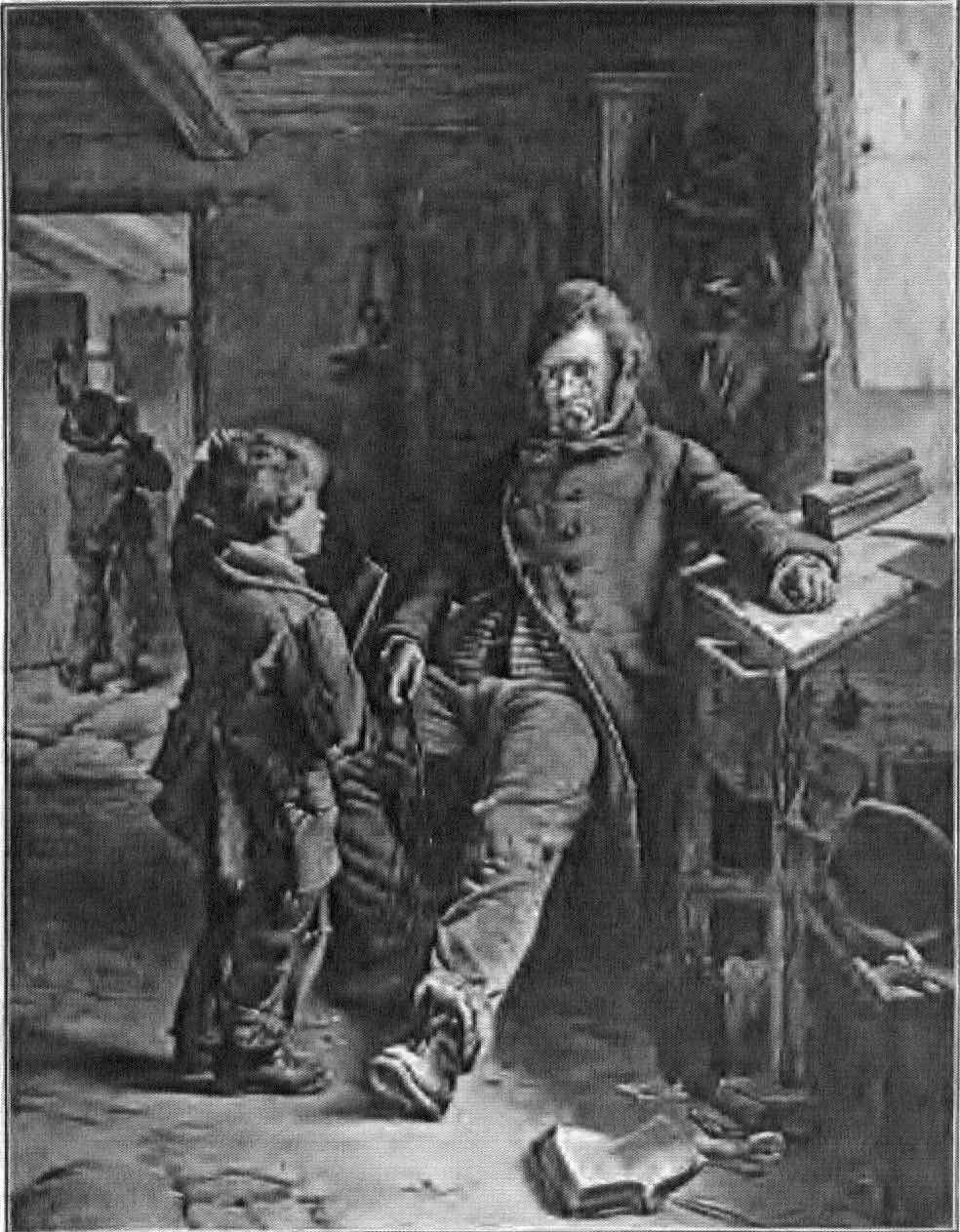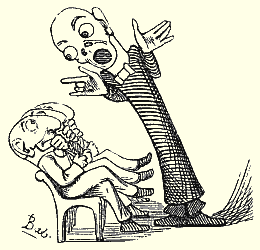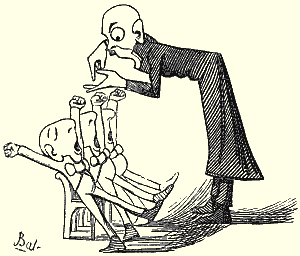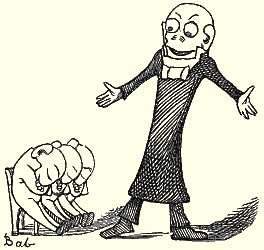| Duty of the Student
It is the duty of the student
Without exception to be prudent.
If smarter than the teacher, tact
Demands that he conceal the fact.
Edward Anthony
The Golden Treasury of Poetry
ed. Louis Untermeyer
Golden Press, New York, 1959.
|
|
History of Education
The decent docent doesn't doze:
He teaches standing on his toes.
His student dassn't doze—and does,
And that's what teaching is and was.
David McCord
And What's More
Coward-McCann, New York, 1941.
|
| The Glory that was Greece
When eras die, their legacies
Are left to strange police.
Professors in New England guard
The glory that was Greece.
Clarence Day
Thoughts Without Words
Alfred A. Knopf, New York, 1928.
|
|
Epitaph on a Syndic
No teacher I of boys or smaller fry,
No teacher I of teachers, no, not I.
Mine was the distant aim, the longer reach,
To teach men how to teach men how to teach.
A. B. Ramsey
More Comic and Curious Verse
ed. J. M. Cohen
Penguin Books, Hammondsworth, 1956.
|
| The Masque of Balliol (excerpt)
First come I. My name is Jowett.
There's no knowledge but I know it.
I am the Master of this college,
What I don't know isn't knowledge.
Henry Charles Beeching
A Century of Humorous Verse
ed. Roger Lancelyn Green
Dent, London, 1959.
Flower for a Professor's Garden of Verses
A teacher should impart what's true
At least what they allow him to;
A college teacher should not vex
His pupils with his thoughts on sex;
He should keep mum if he has odd
Views on the character of God.
He should dismiss as red inventions
All but the three well-known dimensions,
Not teaching logic, which might hurt
Young minds impeccably inert,
Nor ever question any truths
Their nurses taught these darling youths.
No skepticism—that might lead them
To use their heads if they should need them.
Only such views by housewives favored—
Be, teacher, be vanilla flavored.
Make your lectures chocolate fudge
Fit to be nibbled by a judge;
Cookies sweet enough to dish up
Before a bon-bon loving bishop,
Or shall we say an angel layer
To set before an upright mayor.
Then will your thoughts be sure to keep
Your students sound, and sound asleep.
And keep for you, though far from clever,
Your job—and what a job!—forever!
Irwin Edman
Innocent Merriment
ed. Franklin P. Adams
Whittlesey House, New York, 1942.
|
|
Don's Holiday
Professor Robinson each Summer beats
The fishing record of the world -- such feats
As one would hardly credit from a lesser
Person than a history professor.
George Rostrevor Hamilton
The Faber Book of Comic Verse
ed. Michael Roberts
Faber and Faber, London, 1942.
Academic Roll Call: Pedant
On campuses remote and shaded
You find the pedant,
Dry and faded,
Who, once mistaking books
For bread,
By incunabula is fed.
His mind is recondite
But tidy,
Arranged for Monday's class through Friday
With data
Learnéd and congealed
On the minutiae of his field.
An academic look has he.
Dear God,
Preserve the faculty!
Helen Bevington
Dr. Johnson's Waterfall and Other Poems
Houghton Mifflin Comany, Boston, 1946.
|
 The image which may have led you to these teaching rhymes is from
The Treasury of Humorous Poetry, ed. Frederic Lawrence Knowles, Dana
Estes & Company, Boston, 1902. It illustrates The Irish
Schoolmaster, by James A. Sidey, an dialect poem not untypical
of some of the humorous verse of the nineteenth century. Here
is the second stanza (of ten, all very much in the same regrettable vein):
The image which may have led you to these teaching rhymes is from
The Treasury of Humorous Poetry, ed. Frederic Lawrence Knowles, Dana
Estes & Company, Boston, 1902. It illustrates The Irish
Schoolmaster, by James A. Sidey, an dialect poem not untypical
of some of the humorous verse of the nineteenth century. Here
is the second stanza (of ten, all very much in the same regrettable vein):

